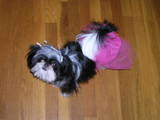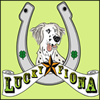ASPCA has some helpful tips for you and your furry friends
to enjoy a safe and happy holiday season.
"Easy Tips for a Pet-Safe Holiday Season
There’s nothing more scrumptious than gathering with friends and family for the holidays, but many of the ingredients in human fun can result in distress for pets. As we kick off this season of lights, parties and yummy treats, the ASPCA wants to remind pet parents of the potential hazards certain goodies and décor can pose to our furry friends.
“As you prepare for your holiday celebrations,” says Dr. Steven Hansen, Senior Vice President of ASPCA Animal Health Services, “remember to be wary of foods and traditions that can bring potential dangers to companion animals.”
In honor of the joyous season to come, ASPCA poison control experts offer these essential tips for having pets at the party in a safe way:
Avoid Too Much of a Good Thing
While the holidays are a time for giving, there are some foods you should not share with your furry friends. A taste of mashed potato or a lick of pumpkin pie shouldn’t pose a problem. However, alcoholic beverages, coffee, onions, fatty foods, yeast dough and macadamia nuts can all lead to stomach upset, diarrhea or even worse—an inflammatory condition of the pancreas known as pancreatitis. A special no-no is chocolate, which if ingested can lead to death. And you may want to skip sharing the turkey—poultry bones can splinter and cause blockages.
Put the Meds Away
One of the most common holiday-related emergencies is the consumption of human pharmaceuticals. Make sure all your medications are securely locked away, and be sure to tell your guests to keep their meds zipped up and packed away, too.
That Holiday Glow
When you leave the room, put the candles out! Animals can easily knock lit candles over, causing a fire, and curious cats are particularly at risk of getting burned by candle flames. Also, be sure to use appropriate candle holders, placed on stable surfaces.
Decorations Can Be Dangerous
Holiday decorations such as breakable ornaments, string, ribbon and dreidels should be kept out of paws’ reach. These traditional decorations can cause choking or severe intestinal problems if swallowed. All holiday light strands, loose wires and electric cords can also pose serious dangers to your pet, especially puppies, who may chew on them.
Go Tinsel-less
Kitties love this sparkly, light-catching “toy” that’s easy to bat around and carry in their mouths. But a nibble can lead to a swallow, which can lead to an obstructed digestive tract, severe vomiting, dehydration and possible surgery. It’s best to brighten your boughs with something other than tinsel.
Forgo the Flowers
Be careful with holiday floral arrangements. Lilies are commonly used this time of year and all varieties, including Tiger, Asian, Japanese Show, Stargazer and Casa Blanca can cause kidney failure in cats. In addition, common Yuletide plants such as mistletoe and holly berries can be potentially toxic to pets. Holly, when ingested, can cause pets to suffer nausea, vomiting and diarrhea. Mistletoe can cause gastrointestinal upset and cardiovascular problems. Safe alternatives include artificial flowers made from silk or plastic.
Oh, Christmas Tree
Cats often see trees as fabulous climbing posts. Be sure to securely anchor your tree so it doesn’t tip and fall, causing possible injury to your pet. Also keep in mind that tree water may contain fertilizers that can cause stomach upset if ingested. Stagnant tree water can also act as a breeding ground for bacteria, and, if ingested, a pet may suffer nausea, vomiting and diarrhea.
New Year’s Noise
As you count down to the New Year, be alert to any pet hazards such as noise-makers and confetti. Noise-makers can frighten your pets, causing them to bolt out an open door or window. Confetti, if ingested, can wreak havoc on the digestive tract.
Holiday Travel
Before traveling with your pets by car or plane, make sure they have all the required vaccinations and are wearing identification tags or are microchipped. If you're traveling by car, be sure to secure your pet safely with a seatbelt harness, crate or barrier and make frequent stops, allowing pets time to exercise and relieve themselves.
If your dog or cat accidentally ingests any potentially harmful products and you need emergency advice, please consult your veterinarian or the ASPCA’s Animal Poison Control Center at (888) 426-4435 (a fee applies) or www.aspca.org/apcc."
{ via ASPCA }







Just stopped by during my morning blog readings, Great post for pet lovers as I am..... :o)
ReplyDeleteTrish
(http://clubbeetlebop.blogspot.com/)